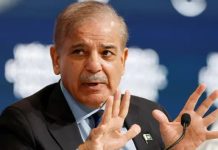DNA
ISLAMABAD: The Pakistan Industrial & Traders Associations Front (PIAF) has warned the record inflation and high cost of doing business would hurt economic growth, demanding a careful policy to keep it in control.PIAF Chairman Faheem ur Rehman Saigol said that the most serious threat to the economy in the current fiscal year would be inflation, as the government plan of approaching the donors for further financial assistance will bring a fresh wave of price-hike, because inflation is already hitting economy due to continuous raise in oil prices and depreciation of local currency.He predicted that inflation would remain high and may even increase further due to market frictions caused by relative demand and supply gap of essential items, exchange rate depreciation and recent upward adjustment of administered prices of petrol and diesel.The PIAF leader called for keeping check on government expenditure and high cost of debt servicing to contain budget deficit, as the Pakistan’s federal budget deficit projection has been revised to history’s highest to over Rs 6 trillion, highlighting the unending fiscal woes that have pushed the country into a debt trap despite putting additional burden of billions of rupees on industry in the current fiscal year.Expressing serious concern over the high jump in country’s budget deficit, PIAF Chairman Faheem ur Rehman Saigol said the revision has been made in light of agreement with the International Monetary Fund, which exposed the massive underreporting of expenditures at the time of budget presentation by the Finance ministry.This is a highly unsustainable level and has already pushed the country into a situation where debt restructuring seems to be the only viable option.The PIAF chairman maintained that the failure to reform the tax system and increase revenue collection is a major factor behind heavy domestic and foreign borrowings by the government.In view of the low level of available FX reserves, the debt management strategy of Pakistan may have to be revisited, to ensure the stability of Pakistani rupee and restoration of international capital markets’ confidence in the economy of Pakistan.In the last fiscal year, Pakistan had registered a record federal budget deficit of Rs 5.5 trillion, breaching the annual target by a wide margin of Rs 1.5 trillion.He advised the government to avoid hard restructuring, which is painful. Instead, it urged Pakistan to go for debt re-profiling with the official and commercial creditors under the G20 Common Framework. He stated that debt stabilisation was unlikely in the short term given the need to address the flood consequences and finance the current account deficit.At the same time, international rating agencies have continued to downgrade Pakistan in 2022-23 in the CCC category and the sovereign USD yield curve is now inverted, reflecting market expectations of default and ensuing restructuring by Pakistan.He said that due to the lagged effect of floods, production losses, especially of major agriculture crops, has not yet been fully recovered. Consequently, the shortage of essential items has emerged and persisted. Inflation may further jack up as a result of second round effect.He said the IMF loan would have devastating effects on the economy, as with more taxes and increased rates of utilities, cost of production would further increase. This will render Pakistani exports uncompetitive in the global market.PIAF chairman said that there is a consensus that a low inflation rate helps economic activities, while high inflation hurts economic growth. The high inflation environment affects decision making of all economic agents in economy, like investors, savers, consumers and producers through uncertainty about the expected payoffs from their decisions.

















